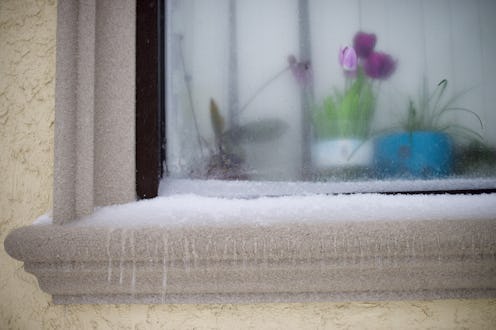Life
8 Ways To Protect Your Home During Extremely Cold Weather

If you have to keep your jacket on inside and you've been wearing a knit hat to bed, chances are your home is not as winterized as you'd like it to be — or, you just really like your outerwear. Knowing how to protect your home during extremely cold weather is the first step to increasing your winter comfort level and protecting your home, but implementing those changes is the part many us get hung up on.
Though it's easy to assess that a drafty window can be the culprit of a chilly room, understanding what to do about that window — short of replacing it altogether — is not necessarily intuitive. Whether you're renting an apartment, or living in a home you own, there's only so much you can do when it's already the dead of winter and you're already feeling colder inside than you should be.
Here I've put together a list of ways to protect your home when it's ~extra~ cold out. Aka, when you find out there's a winter weather advisory for the weekend and you don't have time to re-insulate your entire home, but don't want the pipes to burst or the wind to blow your hair from inside. Here are a few solutions you can manage on your own, without spending a ton of money or hiring a outside help:
Caulk Windows & Doors
If you have even the smallest gaps around your windows and doors, you can bet that heat is escaping your house and cold air is coming in. Get yourself some caulk and use it around windows and door frames to seal these cracks. Though replaced door frames and windows might be in the cards in the future, a bit of caulk should get you through the cold weather season.
Protect Your Pipes
If you're worried about your pipes bursting because temperatures are that low, you can leave the faucet on a tiny bit so that water drips. This keeps the water moving which keeps it from freezing. If you believe you have pipes that are already frozen, but haven't burst yet, you can use a hair dryer, heat lamp, electric heat tape, or a portable space heater to thaw frozen to thaw it out.
Seal The Windows
If your windows have functioning shutters, you'll want to close those on extreme weather days, and you'll want to keep your drapes and blinds closed unless there's direct sunlight coming through. If your AC is still in the window, take it out. If there are cracks in the window, caulk them. Lock the windows to make extra sure there's no way for warm air to leave or cold air to enter.
Make Sure The Flue In Your Fireplace Is Closed If You're Not Using It
If you're not using your fireplace, make sure the flue is closed so that you're not getting a draft in your home. If you are using the fireplace, make sure that you are keeping a close eye on it, as extreme wind can intensify the fire.
Use A Door Snake Or DIY It
If you have a door snake, you'll want to use it. If you don't have one, you can use a rolled towel or blanket under the door frame to keep drafts out and heat in. If you're staying home for a while, you can tape the door, but just make sure you have clear access to another door that's totally functional.
Make Sure You Have A Carbon-Monoxide Detector
If you have a furnace in your unit, you'll want to make sure that you have a functioning carbon-monoxide detector. A huge winter danger is carbon-monoxide poisoning, which is caused by improper ventilation of furnaces, generators, charcoal-burning or propane-burning devices, or wood-burning stoves.
Disconnect Outdoor Pipes
This is totally not intuitive, but failing to disconnect your garden hose outside, can jeopardize your pipes inside. If you don't disconnect outdoor pipes from indoor pipes, they cant drain, and leftover water that freezes can lead to issues with indoor plumbing.
Get A Space Heater
If your heating attempts are not keeping the house warm enough, an electric space heater can be a life saver. Just remember to keep them away from blankets, clothing or any other flammable objects and never, ever leave it on and unattended. Make a reminder in your phone if you have to, so that you never forget to turn them off. Besides the fact that you could start a fire, you could end up with a massive energy bill.